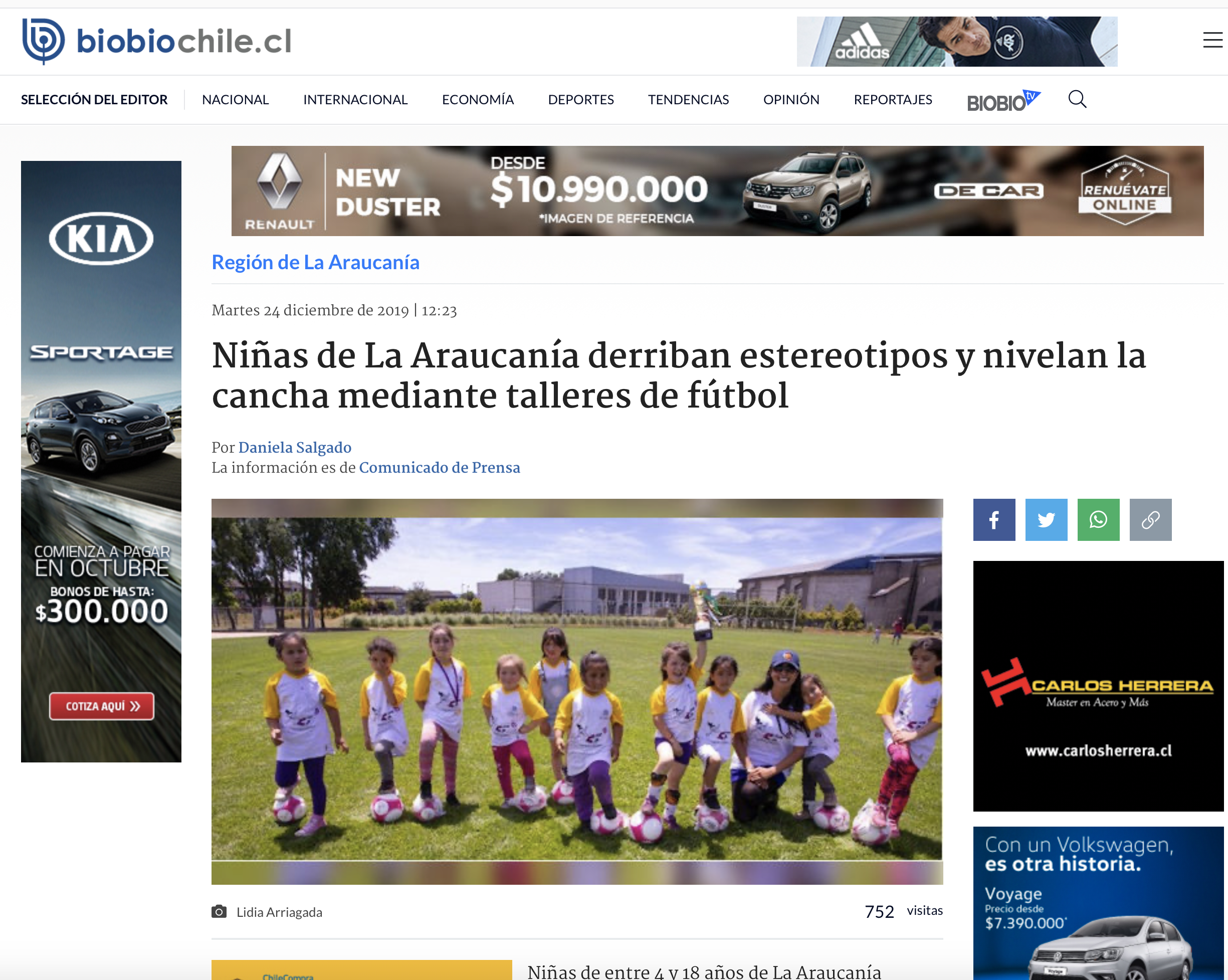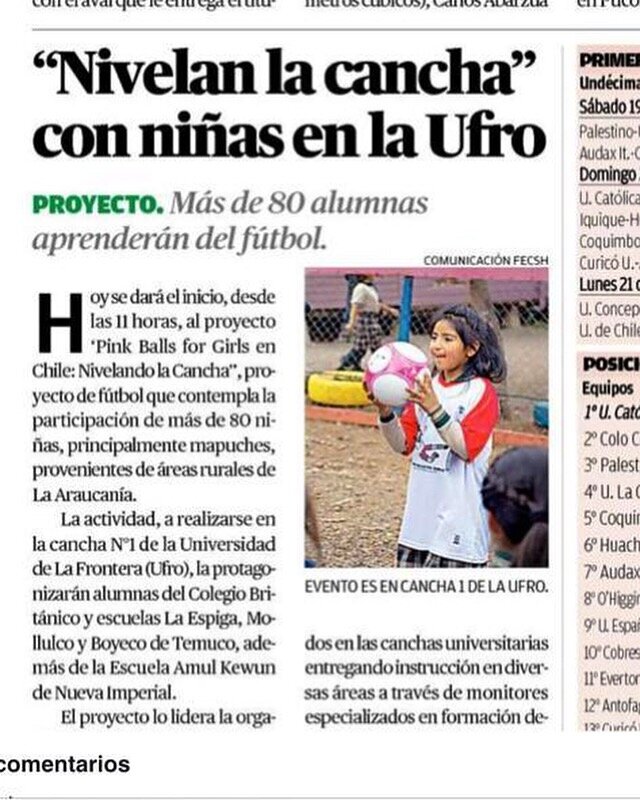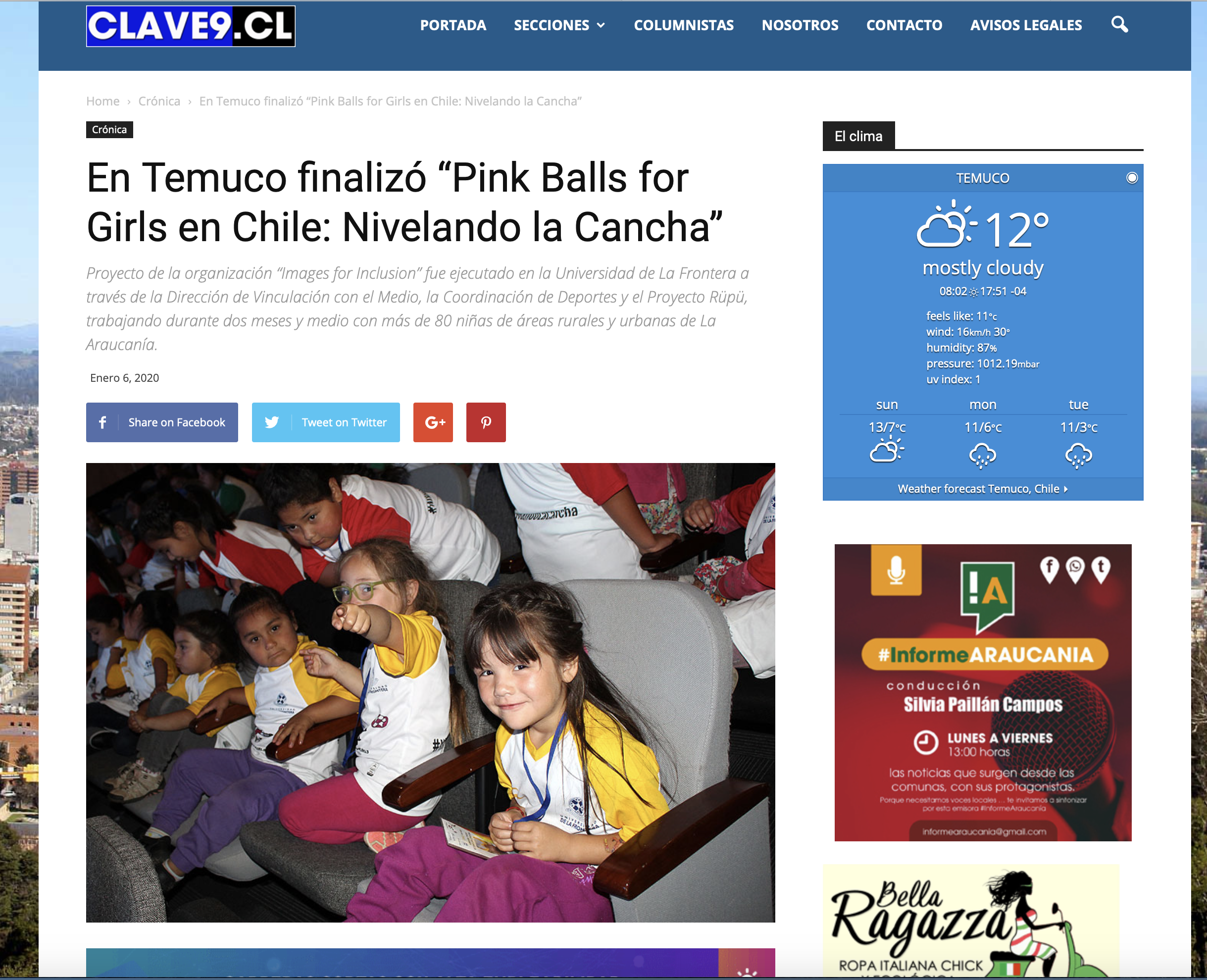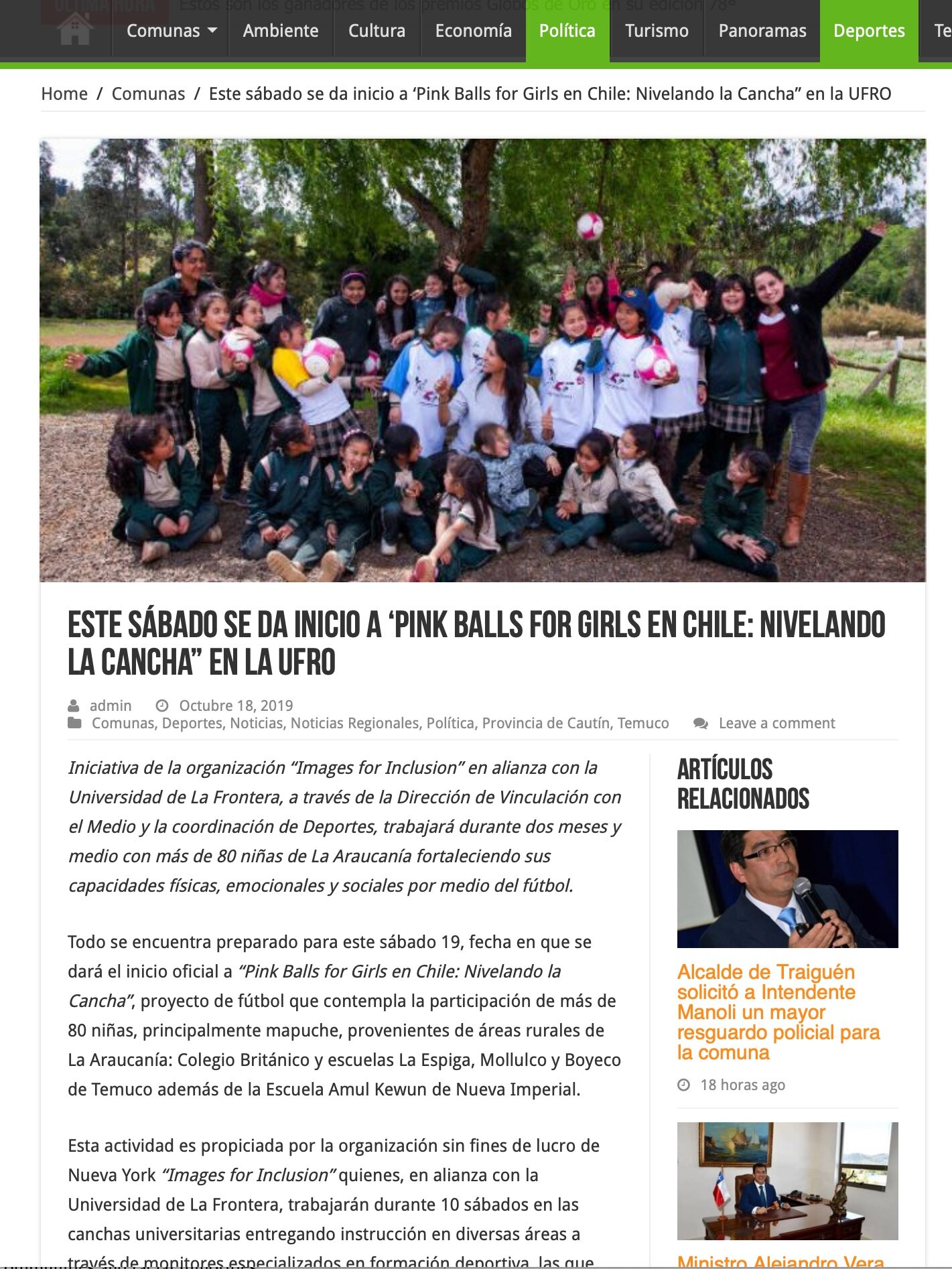Pink Balls For Girls en Chile: Nivelando la Cancha
OFFICIAL GROUP PHOTO OF THE PARTICIPANTS FROM FIVE SCHOOLS AT THE CLOSING CEREMONY, 12/21/19 — JERSEY COLORS - YELLOW, AGES 4-7; RED, 7-10; GREEN, 10-13; BLUE, 13-19
THE PROJECT
Images For Inclusion’s unique and comprehensive pilot program, Pink Balls For Girls en Chile: Nivelando la Cancha (leveling the field), consisted in providing all participants (mainly indigenous Mapuche girls ages 4 to 18 living in rural areas from 5 separate schools) the following: a soccer ball, a t-shirt and a 2-3 months basic training program. It also included lunch and transportation. Among other activities, we showed them documentaries about the history of women’s soccer and other girls’ experiences in other countries to inspire and encourage all participants to be confident and believe in themselves.
This pilot program took place in the poorest region of Chile and where the majority of the indigenous population is Mapuche (71% of the Mapuche live in Santiago, the Metropolitan region) and thereby suffer from constant racial and gender discrimination and social exclusion. We were supported by the Embassy of the United States of America in Santiago with the purpose of creating social inclusion. We also created an alliance with a local University in Temuco, La Araucania Region, called La Frontera, to be able to increase the number of girls who benefited and attain all our goals.
THE CONTEXT
Soccer (fútbol) is a male dominated sport in Chile, loved and cherished by the masses. However, girls rarely get to have a soccer ball of their own or get training to learn how to play this wonderful sport. While many government, educational entities, and organizations promote and finance sports like soccer (fútbol) for all, girls rarely have the chance to enjoy those benefits. The ones who play don’t have the benefits of soccer clubs and are usually given poor soccer fields, inadequate scheduling, and almost no basic infrastructure such as bathrooms or changing rooms for girls.
“Since the late nineteenth century, fútbol (soccer) clubs in Chile have debated the potential benefits of women's participation. The most common justification for excluding women is still their supposed lack of interest in soccer.” — Brenda Elsey. Our participants proved this justification is not correct through their testimonies and their persistence to learn and get a soccer ball of their own.
While it is normal for boys to be given a soccer ball for their birthdays and Christmas and taught to play “a la pelota” (soccer), girls are still told it’s a boy’s game and tend to receive a doll or kitchen toy. Even if they want to play fútbol, the majority of them are excluded, and can only dream of becoming a professional soccer player like Christiane Endler, who is the greatest goalkeeper, role model and leader.
BLUE GROUP : 13 - 19 YEAR-OLD PARTICIPANTS
PARTICIPANT FROM RED GROUP : 7 - 10 YEAR-OLD PARTICIPANTS
STATISTICS
Currently there is no desegregated data about the number of girls who play soccer in Chile and is not possible to determine how much of federal funds destined for sports like soccer are assigned to benefit girls. The inequalities, however, are evident, and calls must be made for laws such as Title IX, that would prohibit gender-based discrimination in any education program that receives federal funds.
STATISTICS FROM OUR PROJECT PINK BALLS FOR GIRLS IN CHILE © IMAGES FOR INCLUSION
In our applications forms we asked these questions: do you own a soccer ball?, have you played soccer before? and, why would you like to be part of this program? — The results are shown on the chart bellow. Our records also showed that despite all challenges, our project’s participants maintained a high percentage of attendance.
WHAT HAD WE DONE IN NEW YORK TO SUPPORT FEMALE SOCCER IN CHILE
SOCCER FOR ALL ❤️ — NEW YORK CITY — SEPTEMBER 15, 2017
NEW YORK CITY — Junes 16, 2019
Being aware of the gender based inequities in futbol, we wanted to show people in Chile how Women’s soccer can be a great thing. On September 15, 2017, we offered free empanadas (a traditional Chilean dish) for Chilean residents in NYC to come and watch the Chilean women’s national team play a friendly game against France, but less than 10 people showed up. We struggled trying to find a spot. The main sports bars with more affinity to soccer would accept our requests, but once they realized it was a Chile women’s soccer match, they would decline our requests and even hang up on us.
In another sad, but not surprising instance, we made a big effort to invite the Chilean community in New York to watch the Chilean Women’s Soccer Team play exactly at the spot they usually watch the Chilean games, but only two people came to support the Chilean team while the rest of the bar was full with American men and women supporting the USA team. A week later, there was a Chilean Men’s Soccer match, and the bar was full with Chilean men and women supporting them.
Despite the poor interest in Chilean women’s soccer, we made it to the local New York newspaper, which read, “The United States has an important community of Chileans residing in different States”. In New York there is a group called the "red tide", in which they organize people to watch matches, whether it’s for the American Cup or World Cups. They meet at the Smithfield Hall bar and one of the organizers is Jorge Fonseca. "When the Red plays, 200 to 300 Chileans arrived. For the girls' game only three Chileans arrived, but many people provided support through our page. Many stayed celebrating Father's Day", June 16, 2019.
Four months later, we brought our Pink Balls for Girls pilot program to Chile and decided
HEADING TO THE SCHOOLS TO PICK UP APPLICATION FORMS
PARENTS AND TRAINERS CONFERENCE
The purpose of the parents and trainers conference was to enhance the knowledge and understanding of our project’s objective and to provide an opportunity for parents to share their concerns. It was mandatory to officially register the participants. We also let them know we needed their support as it was essential to for the project to be successful. We were happily surprised to see the room full. Several parents whose daughter had not been selected came asking to add them to our waiting list.
HAVING THEIR PHOTOS TAKEN AND GIVEN IDENTITY CARDS
Photo sessions tend to raise people's self esteem because it often makes them feel special, important and no longer invisible. The Credentials we created with their portraits were beneficial for the girls not only as a form of identification, but they helped the girls see themselves as an important part of our project. In addition, it provided a sense of unity among all participants, which in turn promoted a healthy and friendly environment. They also became testimonials and mementos that will last for a lifetime.
THE INAUGURATION — THE START OF A DIFFICULT, BUT BEAUTIFUL JOURNEY — BRAVO!
OUR MOTIVATIONAL MESSAGE FROM THE MAPUCHE SOCCER PLAYER WHO IS A MEMBER OF CHILE NATIONAL WOMEN’S SOCCER TEAM
OUR MOTIVATIONAL MESSAGES FROM TWO FEMALE SOCCER PLAYERS FROM THE CHILE NATIONAL WOMEN’S SOCCER TEAM
SURPRISE THANK YOU VIDEO PREPARED FOR THE INAUGURATION
THE FIRST CLASS AFTER THE INAUGURATION
We started our first class right after the inauguration. It was a crucial moment after much effort had been done to bring this project to life. We felt truly blessed.
THE ENCOURAGEMENT MESSAGE FROM THE NATIVE AMERICAN CONGRESSWOMAN
First indigenous Congresswoman for New Mexico, and now Secretary of Interior.
We had the tremendous honor and pleasure to get an inspiring and empowering message from Deb Haaland. She sent us this beautiful message for the inauguration of our Pink Balls for Girls en Chile: Nivelando la Cancha inauguration event.
LUNCH FOR ALL PARTICIPANTS
Our lunch included water or juice, salad, fruit or dessert, and a choice of two main meals. It was greatly appreciated by all since the classes started at 9am and the girls had to travel an hour to get there and finished around 1pm, so a nutritious meal was needed and well deserved.
TRANSPORTATION TO AND FROM RURAL SCHOOLS
SOCIAL STRUGGLE IN CHILE — THE CANCELATION OF CLASSES
“On 25 October 2019, over 1,2 million people took to the streets of Santiago to protest against social inequality, demanding President Piñera's resignation, in what was called as The biggest march of Chile. As of 28 December 2019, 29 people have died, nearly 2,500 have been injured and 2,840 have been arrested.”— Wikipedia.
Due to the social unrest and political upheaval in the country occurring at the beginning of our project, 4 out of 10 total sessions were cancelled for security concerns. We were concerned that girls would be subject to teargas, rubber bullets, and water cannons aimed at the protestors and people near the area where they received the training. We managed to recover 2 classes during week days in December, but we missed two trips to the stadium to see a game.
KEEPING THE GOOD WORK IN SPITE OF IT ALL
LEARNING ABOUT THE STRUGGLES OF WOMEN IN SOCCER IN ARGENTINA BY WATCHING A DOCUMENTARY
WRITING THEIR IMPRESSIONS ABOUT THE DOCUMENTARY AND A STORY OF THEIR OWN
LEARNING ABOUT THE HISTORY AND DEVELOPMENT OF FEMALE SOCCER IN EUROPE BY WATCHING A DOCUMENTARY
LEARNING THE LANGUAGE OF FÚTBOL AND USING IT WHILE WRITING OR DRAWING ABOUT THEIR OWN EXPERIENCES
THEY ANSWERS THROUGH DRAWINGS
BUILDING CONFIDENCE AND BOOSTING THEIR SELF ESTEEM WHILE LEARNING ABOUT EACH OTHER
Greeting each other at the start of each class was mandatory. Girls were asked to say their full name, where they came from, their indigenous nation and why they were there.
VISIT FROM A MAPUCHE LEADER FROM PUELMAPU (ARGENTINA)
Our participants expressing how they would like to be professional soccer players.
OUR FINAL
YELLOW TEAM : 4 - 7 YEAR-OLD PARTICIPANTS
GREEN TEAM : 10 - 13 YEAR-OLD PARTICIPANTS
RED TEAM: 7 - 10 YEAR-OLD PARTICIPANTS
BLUE TEAM : 13 - 19 YEAR-OLD PARTICIPANTS
Our aim was to empower them by helping raise their self-esteem, develop leadership, team work and communication skills, and for them to enjoy other great benefits of playing soccer. We envisioned the girls being happy, exercising their rights, and having equal opportunities for healthy emotional, social and physical development. And we did it!
SOCCER MOMS
Keeping all participants and their parents/guardians engaged and motivated, especially throughout the time we had to cancel our classes due to the social explosion in Chile, was truly challenging, but everyone’s commitment and particularly the moms, helped us move forward and accomplish our goals. They were our greatest allies and we thank them deeply for their trust, persistence, and their unconditional support for their daughters.
CLOSING CEREMONY MAPUCHE MUSIC AND PARTICIPANT’S SPEECH
CLOSING CEREMONY: TROPHIES AND MEDALS TO SHOW WHAT THEY HAVE DONE
We provided medals to all girls at the Closing Ceremony and one trophy was awarded to each school that participated so they could be proud of the girls’ accomplishment.
CLOSING CEREMONY: CERTIFICATES OF HAVING COMPLETED THE PROGRAM
These were direct steps and actions we created that gave the girls a visible sense of accomplishment, and mementos they will keep and cherish forever.
ALL TEAMS’ GROUP PHOTOS
MAKING IT TO THE NEWSPAPER




We felt very honored and very proud to make it to the Online News and the main regional Newspaper’s Front Page and Sports section at the end of our project. Unfortunately, the sports section seemed unwilling to understand we were teaching girls how to play soccer and they published that we were giving physical education classes instead of fútbol (soccer). Regardless, we thanked them for the great opportunity. Click on the Next & Previous arrow to view all news posts.
There is a long way to go to make “soccer for all” a reality. That is why making a Documentary about The Pink Balls for Girls is important to help promote inclusion and create a virtual cultural exchange with soccer players in the U.S. and to address current and historical issues of exclusion of females in soccer in Chile and the even greater challenges that Indigenous girls and women face today to get a soccer ball of their own.















































